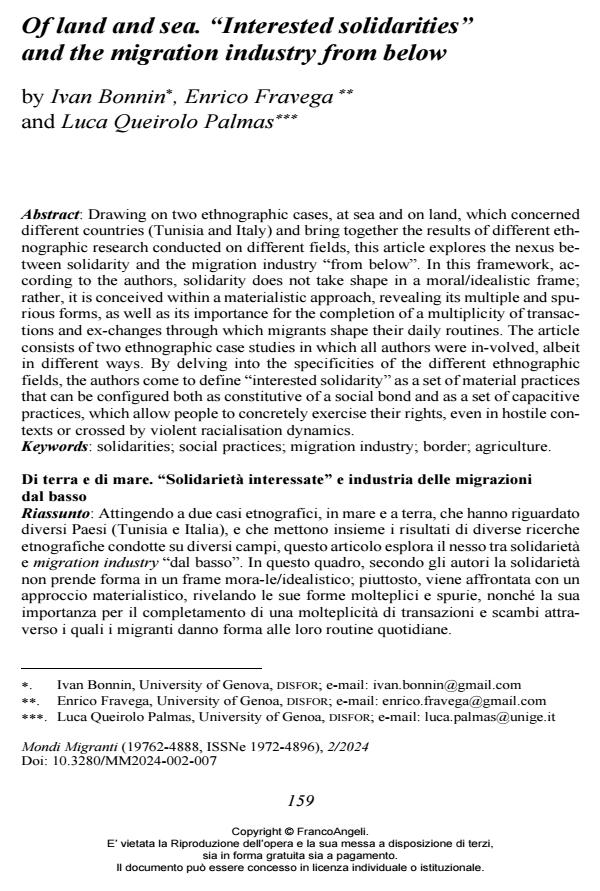Of land and sea. “Interested solidarities” and the migration industry from below
Titolo Rivista MONDI MIGRANTI
Autori/Curatori Ivan Bonnin, Enrico Fravega, Luca Queirolo Palmas
Anno di pubblicazione 2024 Fascicolo 2024/2
Lingua Inglese Numero pagine 31 P. 159-189 Dimensione file 286 KB
DOI 10.3280/MM2024-002007
Il DOI è il codice a barre della proprietà intellettuale: per saperne di più
clicca qui

FrancoAngeli è membro della Publishers International Linking Association, Inc (PILA), associazione indipendente e non profit per facilitare (attraverso i servizi tecnologici implementati da CrossRef.org) l’accesso degli studiosi ai contenuti digitali nelle pubblicazioni professionali e scientifiche.
This paper explores economic interactions between displaced people, local societies and spatial dimensions of migration management and border con-trols, most notably camps, focusing on the northeast Aegean islands of Chios and Lesvos. It explores the diverse activities, practices, transactions and rela-tions developing in, around and in relation to migrant camps, the array of eco-nomic actors involved, and the multiple spatialities operating at different scales. These actors intersect in various ways and occasionally interact in overlapping networks, stimulating “developmental” processes in fields of eco-nomic activities within but also beyond the migration industries. Building pri-marily on fieldwork conducted on the two islands in 2020, as well as on sec-ondary data and desk research, the paper argues that reception policies create value and mobilise resources in ways that may deepen existing inequalities or even produce new ones, capitalizing on the presence of the migrants them-selves.
Questo articolo esplora le interazioni economiche tra rifugiati e migranti for-zati, le società locali e la dimensione spaziale dei campi nella gestione delle migrazioni e nei controlli alle frontiere, con un fuoco sulle isole dell’Egeo nord-orientale di Chios e Lesbo. Vengono esplorate le diverse attività, le prati-che, le transazioni e le relazioni che si sviluppano all’interno, intorno e in re-lazione ai campi per persone in movimento, la gamma di attori economici coinvolti e le molteplici spazialità che operano a diverse scale. Questi attori si intersecano in vari modi e occasionalmente interagiscono in reti sovrapposte, stimolando processi di “sviluppo” in campi di attività economiche all'interno ma anche al di fuori delle industrie della migrazione. Basandosi principalmen-te sul lavoro sul campo condotto nelle due isole nel 2020, oltre che su dati se-condari e ricerche documentali, questo contributo sostiene che le politiche di accoglienza creano valore e mobilitano risorse in modi che possono approfon-dire le disuguaglianze esistenti o addirittura produrne di nuove, capitalizzando la presenza dei migranti stessi.
Parole chiave:gestione delle migrazioni; campi; industrie migratorie; isole del Mar Egeo; rifugiati e richiedenti asilo.
- Indigenous Solidarities and Contemptuous Ethnographic Fieldworks Rassa Ghaffari, Luca Queirolo Palmas, in Critical Criminology /2025 pp.5
DOI: 10.1007/s10612-025-09820-9 - Who are the Smugglers? Ethnography on Mobility Facilitation Practices at the Sfax and Ventimiglia Borders Livio Amigoni, Ivan Bonnin, in Critical Criminology /2025 pp.89
DOI: 10.1007/s10612-025-09825-4 - Inside the Pushback Apparatus in Tunisia: Countering Mobility, Extracting its Value and Manufacturing Infrastructures of Solidarity Luca Queirolo Palmas, Camille Cassarini, in Critical Criminology /2025 pp.33
DOI: 10.1007/s10612-025-09822-7 - Agricultural Extractivism in the Mediterranean Region Juan Castillo-Rojas-Marcos, Yoan Molinero-Gerbeau, Gennaro Avallone, pp.147 (ISBN:978-3-032-05598-9)
Ivan Bonnin, Enrico Fravega, Luca Queirolo Palmas, Of land and sea. “Interested solidarities” and the migration industry from below in "MONDI MIGRANTI" 2/2024, pp 159-189, DOI: 10.3280/MM2024-002007